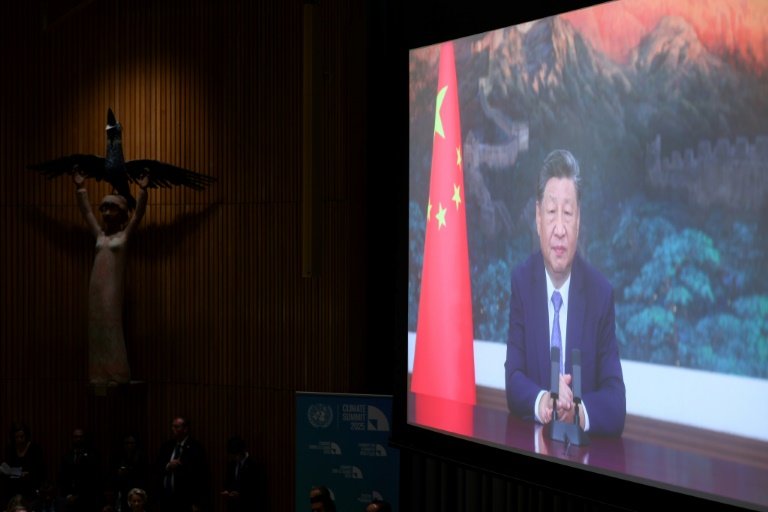World
China Sets First Absolute Emissions Targets Ahead of Climate Summit

China announced its first absolute emissions reduction targets on Wednesday, marking a significant milestone for the world’s leading greenhouse gas emitter. During a video address to a United Nations climate summit, President Xi Jinping pledged to cut the nation’s economy-wide emissions by 7 to 10 percent by 2035, relative to the year of the country’s peak emissions, projected to occur in 2025. This commitment comes as global leaders gather to discuss strategies for addressing climate change, which has intensified environmental disasters worldwide.
The new targets are part of a broader strategy that includes expanding wind and solar energy production sixfold from 2020 levels, significantly increasing forest cover, and boosting electric vehicle production. While the announced figures may appear modest, analysts note that China has a history of exceeding its environmental commitments, propelled by rapid advancements in green technology. This initiative contrasts sharply with the current U.S. approach under President Donald Trump, who has emphasized fossil fuel development.
In his address, Xi stated, “Green and low carbon transition is the trend of our time. While some countries are acting against it, the international community should stay focused in the right direction.” As responsible for nearly 30 percent of global emissions, China’s commitment is crucial for international climate efforts.
Global Context and Historical Commitments
China had previously aimed to peak carbon emissions before 2030 and achieve carbon neutrality by 2060, but had not established near-term numeric targets for total emissions reductions until now. This new goal aligns with efforts by other nations to enhance their climate initiatives ahead of COP30, to be held in 2025 in Belem, Brazil.
Despite China’s progress, experts caution that its current trajectory may not suffice to meet the 1.5°C warming limit established by the 2015 Paris Agreement. According to Li Shuo, an expert at the Asia Society think tank, the commitment reflects a cautious approach that prioritizes steadiness over ambition. He noted, “The good news is that in a world increasingly driven by self-interest, China may be better positioned than most to advance climate action.”
Most wealthy nations, which historically contributed significantly to global warming, have already peaked their emissions but lack credible plans to reach carbon neutrality by 2050. For instance, the European Union is grappling with internal debates about the pace of decarbonization, with countries like France voicing concerns over potential economic impacts.
Optimism Amidst Global Challenges
The United Nations is striving to balance warnings of impending climate disaster with messages of hope. Antonio Guterres, the UN Secretary-General, recently stated that the chances of limiting warming to 1.5°C are close to “collapsing,” a sentiment echoed by climatologists as current temperatures hover around 1.4°C above pre-industrial levels. Nonetheless, he acknowledged the progress achieved through the Paris climate accord, noting that projected global temperature rise has decreased from four degrees Celsius to less than three over the past decade.
China’s efforts have also contributed to this progress. A decade ago, coal accounted for three-quarters of the country’s energy mix; that figure has now been halved. China’s robust exports of solar panels, batteries, and electric vehicles are helping to reduce emissions beyond its borders as well.
As nations prepare for further discussions on climate policy, China’s new commitments signal an ongoing dedication to international cooperation on climate action, contrasting with the shifting stance of the United States. The attention now turns to how effectively these pledges will be implemented and whether they will inspire other nations to strengthen their climate commitments.
-

 Science2 months ago
Science2 months agoToyoake City Proposes Daily Two-Hour Smartphone Use Limit
-

 Health2 months ago
Health2 months agoB.C. Review Reveals Urgent Need for Rare-Disease Drug Reforms
-

 Top Stories2 months ago
Top Stories2 months agoPedestrian Fatally Injured in Esquimalt Collision on August 14
-

 Technology2 months ago
Technology2 months agoDark Adventure Game “Bye Sweet Carole” Set for October Release
-

 World2 months ago
World2 months agoJimmy Lai’s Defense Challenges Charges Under National Security Law
-

 Technology2 months ago
Technology2 months agoKonami Revives Iconic Metal Gear Solid Delta Ahead of Release
-

 Technology2 months ago
Technology2 months agoSnapmaker U1 Color 3D Printer Redefines Speed and Sustainability
-

 Technology2 months ago
Technology2 months agoAION Folding Knife: Redefining EDC Design with Premium Materials
-

 Technology2 months ago
Technology2 months agoSolve Today’s Wordle Challenge: Hints and Answer for August 19
-

 Business2 months ago
Business2 months agoGordon Murray Automotive Unveils S1 LM and Le Mans GTR at Monterey
-

 Lifestyle2 months ago
Lifestyle2 months agoVictoria’s Pop-Up Shop Shines Light on B.C.’s Wolf Cull
-

 Technology2 months ago
Technology2 months agoApple Expands Self-Service Repair Program to Canada









